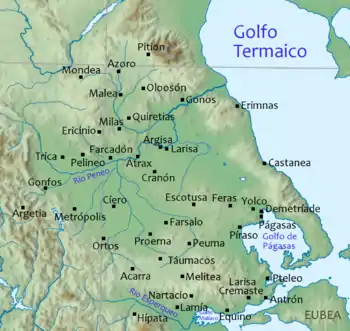Acharrae
Acharrae (Ancient Greek: Ἀκαρρα) was a town and polis (city-state)[1] of Ancient Thessaly in the district Thessaliotis or Phthiotis, on the river Pamisus, mentioned only by Livy,[2] but apparently the same place as the Acharne of Pliny.[3] Livy relates that the retreat of Philip V of Macedon after the Battle of the Aous (198 BC) allowed the Aetolians to occupy much of Thessaly, and these latter gained Acharrae by surrender, whereas nearby Theuma and Celathara were plundered.[2]

Acharrae minted bronze coins at least from the fourth century BC with the inscription «ΕΚΚΑΡΡΕΩΝ».[1]
References
- Mogens Herman Hansen & Thomas Heine Nielsen (2004). "Thessaly and Adjacent Regions". An inventory of archaic and classical poleis. New York: Oxford University Press. p. 714. ISBN 0-19-814099-1.
- Livy. Ab Urbe Condita Libri (History of Rome). 32.13.
- Pliny. Naturalis Historia. 4.9.16.
![]() This article incorporates text from a publication now in the public domain: Smith, William, ed. (1854–1857). "Acharrae". Dictionary of Greek and Roman Geography. London: John Murray.
This article incorporates text from a publication now in the public domain: Smith, William, ed. (1854–1857). "Acharrae". Dictionary of Greek and Roman Geography. London: John Murray.